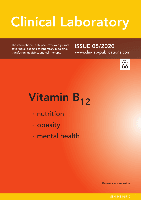
Clinical Laboratory
Scope & Guideline
Fostering Collaboration in Clinical Laboratory Practices
Introduction
Aims and Scopes
- Clinical Diagnostics and Biomarkers:
This area emphasizes the development and validation of diagnostic tests and biomarkers for various diseases, including infectious diseases, cancers, and metabolic disorders. - Laboratory Techniques and Methodologies:
Research on innovative laboratory techniques and methodologies, such as molecular diagnostics, immunoassays, and automation in laboratory settings, is a core focus. - Pathogen Detection and Antimicrobial Resistance:
The journal frequently publishes studies on the detection of pathogens and the antimicrobial resistance patterns, highlighting the evolving challenges in infectious disease management. - Blood Component Management and Transfusion Medicine:
A significant portion of the research addresses blood component management, transfusion practices, and the implications of laboratory findings on transfusion medicine. - Clinical Implications of Laboratory Findings:
Studies exploring the clinical implications of laboratory results in diagnosis, treatment, and prognosis of diseases, as well as their impact on patient outcomes.
Trending and Emerging
- COVID-19 Related Research:
A significant increase in studies related to COVID-19 diagnostics, management, and laboratory implications, reflecting the global health crisis and the need for rapid advancements in this area. - Molecular Diagnostics and Genomics:
Emerging trends in molecular diagnostics, particularly in genetic testing and precision medicine, are gaining prominence, showcasing the integration of genomics into routine laboratory practice. - Biomarkers in Disease Management:
An increasing focus on identifying and validating biomarkers for various diseases, particularly in oncology and infectious diseases, emphasizing their role in personalized medicine. - Point-of-Care Testing Innovations:
A trend towards research in point-of-care testing technologies that enhance rapid diagnosis and patient management, particularly in emergency and primary care settings. - Artificial Intelligence in Laboratory Medicine:
The integration of artificial intelligence and machine learning in laboratory diagnostics is emerging as a vital area of research, aimed at improving accuracy and efficiency in laboratory processes.
Declining or Waning
- Traditional Hematology Techniques:
As advancements in technology and automation have emerged, traditional hematological techniques have seen a decline in research focus, with a shift toward more innovative diagnostic approaches. - General Public Health Studies:
Research that broadly addresses public health issues without a direct connection to laboratory medicine has decreased, as the journal increasingly prioritizes laboratory-specific studies. - Basic Science Research:
There has been a noticeable reduction in basic science studies that do not directly relate to clinical or laboratory applications, as the journal emphasizes translational research.
Similar Journals

Journal of Clinical and Diagnostic Research
Elevating Standards in Diagnostic Research and ApplicationWelcome to the Journal of Clinical and Diagnostic Research, a leading open-access journal published by the PREMCHAND SHANTIDEVI RESEARCH FOUNDATION since 2007. This journal serves as a crucial platform for researchers and professionals in the fields of biochemistry, genetics, and molecular biology, with a particular focus on clinical biochemistry. The journal is recognized for its commitment to disseminating high-quality research, fostering academic dialogue, and enabling practitioners to stay at the forefront of advancements in diagnostic methods. With an ISSN of 2249-782X, the journal enhances accessibility to critical research findings and discussions, ensuring that the scientific community and interested students can engage with valuable insights. Although coverage has been discontinued in Scopus since 2018, its rankings within the clinical biochemistry domain reflect a dedicated scholarly impact that continues to influence research trajectories. We invite you to explore the wealth of knowledge presented in the Journal of Clinical and Diagnostic Research and contribute to the evolving discourse in clinical science.
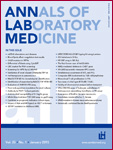
Annals of Laboratory Medicine
Advancing the Frontiers of Laboratory MedicineAnnals of Laboratory Medicine, published by the KOREAN SOC LABORATORY MEDICINE, stands as a pivotal resource for researchers and practitioners in the fields of clinical and medical biochemistry. With a strong Q2 ranking in both Biochemistry (medical) and Clinical Biochemistry, along with a prestigious Q1 status in miscellaneous Medicine categories, this journal emphasizes the significance of laboratory medicine in improving patient outcomes and advancing scientific understanding. Established in 2012, the journal has demonstrated an impressive trajectory of growth and scholarly contribution, making it a reliable source of high-quality research and insightful reviews. The journal utilizes open access, enhancing the reach of its findings across the global scientific community. Operating from South Korea, Annals of Laboratory Medicine aims to foster dialogue and collaboration among professionals, contributing to the continuous advancement of laboratory methodologies and diagnostics.

Journal of Blood Medicine
Unlocking Potential: Transforming Knowledge into Practice in Blood MedicineThe Journal of Blood Medicine, published by DOVE MEDICAL PRESS LTD, stands as a vital resource in the field of hematology, focusing on the latest research developments and clinical advancements in blood medicine. With an impact factor reflective of its growing relevance, this open-access journal has been delivering quality scholarly work since 2010, ensuring that critical research is readily available to the global scientific community. The journal operates under an open-access model, further enhancing its dissemination and accessibility to researchers, professionals, and students alike. In the 2023 rankings, it secured a Q3 category status within hematology and achieved a commendable 76th rank out of 137 in Scopus listings, indicating its commitment to quality and innovation in this specialized area. Located in New Zealand, the journal's diverse topics encompass clinical research, treatment modalities, and emerging therapies, contributing significant insights vital for shaping future advancements in blood medicine.

New Microbiologica
Illuminating the intricate relationships between microbes and medicine.New Microbiologica is a prominent academic journal published by EDIZIONI INT SRL, dedicated to advancing knowledge in the fields of Microbiology and Medicine. Since its inception in 1993, this journal has played a vital role in disseminating cutting-edge research, featuring articles that explore the intricate relationships between microorganisms and human health. With an H-index indicating a robust citation profile and a respectable 2023 Scopus Ranking placing it in the 32nd percentile for medicine microbiology, New Microbiologica resonates well within the academic community. Although not an Open Access journal, it is strategically positioned in Quartile 3 of both Medicine (miscellaneous) and Medical Microbiology categories, which reflects its importance to researchers and professionals seeking valuable insights in their fields. Published in Italy, the journal continues to provide a platform for impactful research through its commitment to high-quality publications, fostering collaboration and innovation among scientists and academics in the ever-evolving landscape of microbiological studies.
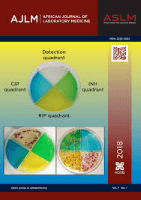
African Journal of Laboratory Medicine
Empowering research, transforming public health.The African Journal of Laboratory Medicine, ISSN 2225-2002, e-ISSN 2225-2010, is a premier publication dedicated to advancing the field of laboratory medicine within the African context. Published by AOSIS since 2012, this Open Access journal aims to disseminate influential research findings, clinical studies, and innovative techniques in the realms of Clinical Biochemistry, Medical Laboratory Technology, and Public Health. Based in South Africa, the journal not only serves as a critical platform for sharing knowledge and best practices but also plays a significant role in fostering public health discussions relevant to the continent. Over the years, it has established itself with impactful rankings in various categories, including a Q4 in Clinical Biochemistry and Q3 in both Medical Laboratory Technology and Public Health. As such, it caters to a diverse audience of researchers, professionals, and students eager to stay at the forefront of laboratory medicine research and its applications. The journal’s commitment to quality and accessibility positions it as an essential resource for those looking to make a significant impact in their respective fields.
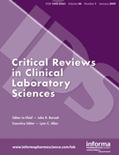
CRITICAL REVIEWS IN CLINICAL LABORATORY SCIENCES
Navigating the Complexities of Laboratory SciencesCRITICAL REVIEWS IN CLINICAL LABORATORY SCIENCES, published by Taylor & Francis Ltd, stands as a premier journal in the field of clinical laboratory science, addressing pivotal advancements and challenges since its inception in 1970. With a commendable impact factor derived from its ranking in Q1 categories across multiple disciplines—including Biochemistry, Genetics and Molecular Biology, and Clinical Biochemistry—this journal is a critical resource for researchers, clinicians, and educators aiming to deepen their understanding and application of laboratory science. The journal's rigorous peer-review process ensures that only the highest quality research is published, providing a platform for profound discussions that influence laboratory practices globally. Although not an open-access journal, it offers various subscription options to facilitate access to its wealth of knowledge. Operating out of Abingdon, England, CRITICAL REVIEWS IN CLINICAL LABORATORY SCIENCES continues to shape the future of clinical biochemistry and laboratory research through its insightful articles, systematic reviews, and expert commentaries, making it an essential read for professionals eager to stay at the forefront of their field.
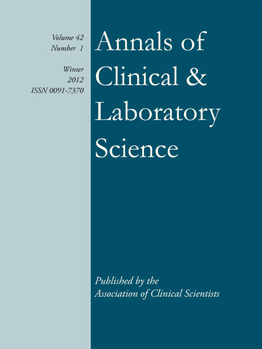
ANNALS OF CLINICAL AND LABORATORY SCIENCE
Empowering Research for Better Health OutcomesANNALS OF CLINICAL AND LABORATORY SCIENCE, published by the Association of Clinical Scientists, is a pivotal journal in the fields of clinical biochemistry, hematology, immunology, and medical laboratory technology. Since its inception in 1971, this journal has become a vital resource for researchers and practitioners aiming to advance their knowledge and skills in laboratory sciences. Although currently not an open access journal, its rich repository of peer-reviewed articles and studies contributes significantly to the academic discourse in diagnostic and therapeutic practices. The journal is categorized in various quartiles, reflecting its impact and contributions to multiple scientific domains, such as Q4 in Clinical Biochemistry and Q3 in Pathology and Forensic Medicine as of 2023. With an extensive convergence of years up to 2024, it proves to be a timeless source for emerging trends and research innovations. The ANNALS OF CLINICAL AND LABORATORY SCIENCE not only supports the professional development of its readers but also encourages interdisciplinary collaboration, making it an essential tool for professionals, students, and researchers dedicated to improving health outcomes through advanced laboratory sciences.
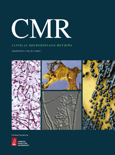
CLINICAL MICROBIOLOGY REVIEWS
Delving deep into the science of microbial challenges.CLINICAL MICROBIOLOGY REVIEWS, published by the American Society for Microbiology, is a leading journal in the fields of epidemiology, immunology, and microbiology, notably recognized for its Q1 status in multiple categories such as Infectious Diseases and Public Health. With an ISSN of 0893-8512 and E-ISSN of 1098-6618, this esteemed journal offers comprehensive reviews and analyses that contribute to the advancement of clinical microbiology practices worldwide. Since its inception in 1988, it has established itself as a pivotal resource for researchers and healthcare professionals, delivering high-quality, peer-reviewed articles that are instrumental in understanding microbial diseases. The journal is highly regarded in the academic community, boasting impressive Scopus rankings, including Rank #1 in Medical Microbiology and a commendable 99th percentile in Public Health. Although not available as an open-access publication, CLINICAL MICROBIOLOGY REVIEWS remains an essential tool for those seeking to enhance their knowledge and practice in microbiology, making significant impacts on clinical outcomes and public health initiatives.

JOURNAL OF BIOMEDICAL SCIENCE
Innovating biomedicine: Where research meets accessibility.JOURNAL OF BIOMEDICAL SCIENCE, published by BMC, is a premier Open Access journal dedicated to the rapid dissemination of research in the fields of biomedical science, encompassing crucial areas such as biochemistry, cell biology, clinical biochemistry, and more. Since its inception in 1993, the journal has established itself as a leading publication, currently boasting a remarkable impact factor and quality as evidenced by its Q1 quartile rankings across multiple categories in 2023. With an impressive track record, including a Scopus ranking in the top percentiles across several disciplines, it serves as a vital resource for researchers, professionals, and students who are keen on advancing their knowledge in biomedicine. The journal operates under a fully Open Access model, ensuring that all published articles are freely available to the global research community, thus contributing to the broader dissemination and accessibility of scientific knowledge. Based in the United Kingdom, JOURNAL OF BIOMEDICAL SCIENCE is committed to fostering innovation and collaboration in research, appealing to those aiming to make impactful contributions to the biomedical sphere.

GEMATOLOGIYA I TRANSFUZIOLOGIYA
Pioneering Research for a Healthier TomorrowGEMATOLOGIYA I TRANSFUZIOLOGIYA is an esteemed journal published by the MINISTERSTVO ZDRAVOOKHRANENIYA in the Russian Federation, focusing on the vital fields of hematology and transfusion medicine. With a rich history dating back to its inception in 1983, the journal plays a significant role in disseminating critical research and advancements in these areas, particularly relevant given the evolving landscape of medical science. As a recognized publication, it is indexed in Scopus and holds a Q4 category ranking in Hematology for 2023, reflecting its niche but important contributions to the field. Researchers, healthcare professionals, and students can look forward to a variety of peer-reviewed articles that not only address contemporary issues but also pave the way for innovative practices in hematology. Although it does not currently offer open access, the journal remains a valuable resource for those seeking to stay informed about the latest findings and developments.